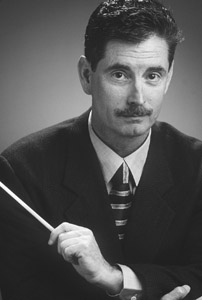![[Metroactive Music]](/music/gifs/music468.gif)
[ Music Index | Santa Cruz Week | Metroactive Central | Archives ]
New Life for
Old Classics
The Santa Cruz Symphony started its season with
a journey through some familiar favorites
By Scott MacCelland
THE BIG WINNER at last Saturday's Santa Cruz Symphony was the release of anxiety and fear that has burdened everyone since Sept. 11. Heightened audience emotions generously rewarded a pops program at the Santa Cruz Civic Auditorium that included the now rarely heard Khachaturian Piano Concerto in D-flat.
Opening a season whose theme promises the "exotic and unique," music director John Larry Granger sought to breath real life into the same music that some classical radio stations overexpose and trivialize into sonic wallpaper, namely Grieg's Peer Gynt, Ibert's Escales and Saint-Saëns' Bacchanale.
In 1936, the Khachaturian concerto was the first of that composer's major works to gain international acclaim, largely due to its colorful instrumentation, quasi-Armenian folk melodies and bravura writing for the solo instrument. It was taken up in the 1940s by William Kapell, the gifted American whose life ended in a plane crash near San Francisco in 1953.
The Santa Cruz performance featured pianist Dickran Atamian, who struggled to make his instrument deliver both a quality and quantity of sound that could stand up to the orchestra. (Room acoustics once again played the devil.)
When he got his solos, Atamian revealed an idiosyncratic and quirky vision of the piece, not one lifted by a grand romantic line the way others have performed it. In the middle movement, with its ornaments and folk-music flavors, Atamian remained circumspect when a lushy build of line and sonority might more memorably have filled the ear. (The flexatone in the percussion section proved to be a real attention-getter, causing heads to crane when it floated up with the violins and eliciting a gathering of the curious during intermission.)
Still, enough bravura came through to spark an enthusiastic outburst at performance end. Jacques Ibert's Escales may be exotic, but it is more derivative than unique. Indeed, its popularity continues to overshadow the large body of his later and more mature works. At least it makes Palermo smell sweeter than the city itself--though the violins were too soft-spoken and thin-sounding after the harp glissandos.
Oboist Dane Carlson held court during the short stop in Tunis. As a test of originality, however, Ibert's portrait of Valencia is little more than a paraphrase of Chabrier's España, composed four decades earlier.
The orchestra sounded its most assured and secure in the program's finale, the Bacchanale from Samson et Dalila, another workout for oboist Carlson, and a feast for the ear of vivacious orchestral writing.
Granger's words about the events of Sept. 11, and the loss on July 31 of the "symphony's best friend," Jean Lerner, were punctuated by the "Star Spangled Banner" and Nimrod from Elgar's Enigma Variations. Then the program opened with a suite of four movements from Grieg's Peer Gynt, including Morning Mood, Aose's Death, Anitra's Dance and In the Hall of the Mountain King. (About the latter, the composer himself once wrote, "I literally can't bear to listen to it, it is so full of cow turds, Norse-Norsehood, and be-to-thyself-enoughness!")
Copyright © Metro Publishing Inc. Maintained by Boulevards New Media.
![]()
 Granger in a Strange Land: Conductor John Farley Granger led the Santa Cruz Symphony through far-flung musical territory.
Granger in a Strange Land: Conductor John Farley Granger led the Santa Cruz Symphony through far-flung musical territory.
From the October 3-10, 2001 issue of Metro Santa Cruz.